Several weeks ago, some parishioners of mine showed me a beautiful set of boxes they dust off every Christmas.
The boxes were new and ornate, but made to look old — 1001 Arabian Nights old. The interiors were lined with red satin and contained gold, frankincense and myrrh. I was confident I could find something similar online, and sure enough, I found it:
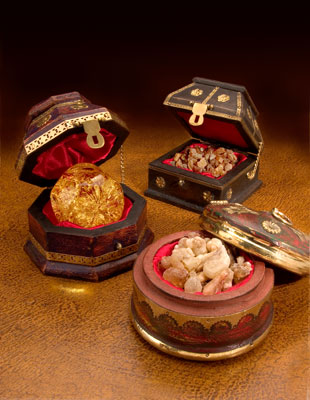
“The Original Gifts of Christmas” — www.threekingsgifts.com
These boxes struck me as very Montessorian. I’ve blogged about Montessorian pedagogy before. It’s an effective and fruitful way of catechesis. Hence my interest in buying these myself. I located a “deluxe set” on Amazon which set me back $50, including postage and handling. Quite reasonable, really.
The chest of gold is octagonal, and contains a glass globe filled with water and large flakes of gold. The chest of frankincense is round, and contains large grains of incense. (I’m chewing on one now, which is a Mid-East custom apparently. It’s a pleasant tasting gum, but not so pleasant I’d do it again.) The chest of myrrh is square, and also contains large grains of incense. I’ve always presumed that the myrrh presented at Bethlehem was in the form of oil, but of course the Scriptures do not specify. It could just as easily have been presented in resin form. (I haven’t chewed on the myrrh, though apparently it is good for toothache!)
I put the set to good use during today’s Epiphany Mass. Some of the children who frequent Sunday Mass assumed the identities of Melchior, Caspar and Balthasar. (In other words, they hung hastily prepared name tags around their necks.)
During the homily, I called each “wise man” forward, and he processed from the back of the church bearing his box. At the sanctuary steps, he opened his box and showed his gift to the congregation before kneeling at the crib and placing his gift before the infant Jesus. While all that was happening, I shared some thoughts on each gift:
Even now, gold evokes royalty, and gold is a gift fit for a king. Especially the King of Kings!
We are called to join Melchior by presenting Jesus with our own gold. We can to that literally by giving money to the Church, and to charity. But we can present other sorts of gold also. Think of the old saying: “if you want to know how rich you are, think of all the things you have that money can’t buy.”
Our friends, our family, health, happiness — we can present these treasures to the Lord too. We can thank and praise him for these gifts, and detach ourselves from them by freely offering them back to God.
Incense, then as now, was used in worship. Caspar’s gift was fit for God, which is exactly who Jesus is: the Word Incarnate; God made man.
We can join Caspar by offering our own worship, especially at Mass. There’s no greater way to offer worship, than to participate in the Mass. But there’s an additional, more metaphorical way by which we can present the Lord with frankincense. Clouds of sweet-smelling incense rising towards Heaven evokes “the odour of sanctity,” or as St Paul puts it, “the fragrance of Christ.” (2 Cor 2:15)
Our own gift of incense to God is a desire to live a noble life. To show understanding and friendship to neighbours. To bring peace and joy to friends. To show mercy and affection to enemies. In other words, to make “the fragrance of Christ” our own.
The ancient Egyptians used myrrh in mummification. And the Jews used myrrh to anoint the bodies of the dead and prepare them for burial.
Hence Balthasar’s gift of myrrh evokes death. It’s a prophecy of the Lord’s passion. The next time myrrh is mentioned in the Gospels is at Calvary: “They offered him wine mixed with myrrh, but he refused to drink it.” (Mk 15:23)
We can imitate Balthasar’s gift of myrrh by offering sacrifice, especially in the little things. The hot weather, a stubbed toe, illness and tiredness are common discomforts which we can offer to the Lord in place of myrrh. We can smile at those who annoy us, hold our tongue and listen to others attentively, and make good use of the time God gives us.
I think anyone who spends any time on the Internet is familiar with the old joke about “three wise women” who aren’t mentioned in the Bible:
There’s no doubt that the three gifts of wise men are less practical. Tradition does hold, however, that the gold and frankincense financed the Holy Family’s flight into Egypt, and our Lady kept the myrrh in safekeeping, until three decades later she anointed her son’s body in preparation for his burial. So the gifts were certainly auspicious.
The greatest symbol of the Epipany however, is not gold, frankincense or myrrh, but the star which guided the Magi to Jesus. The star of Bethlehem is evocative of the light of Christ, which we carry within us — the fruit of our baptism and Confirmation, replenished by prayer and holy communion. In the word’s of today’s Solemn Blessing:
Since in all confidence you follow Christ,
who today appeared in the world as a light shining in darkness,
may God make you, too, a light for your brothers and sisters.
Amen.


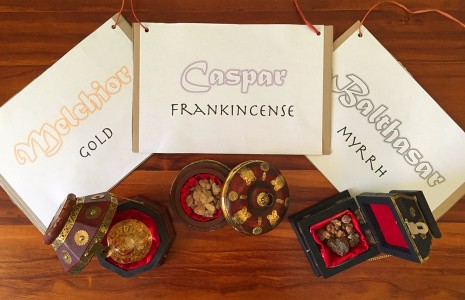
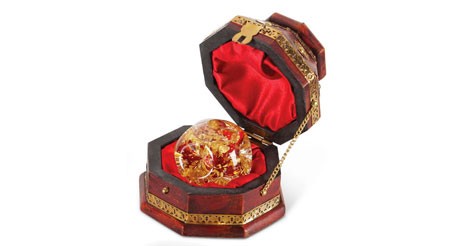
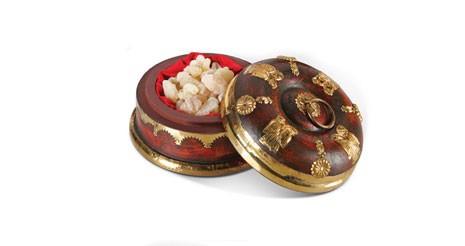
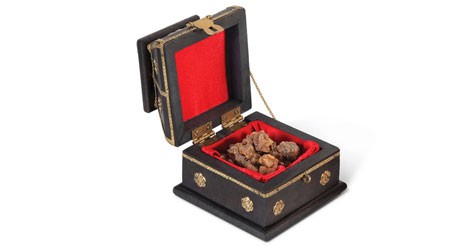
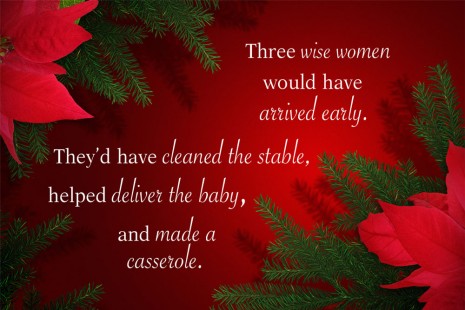

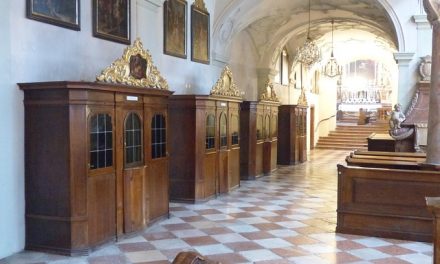
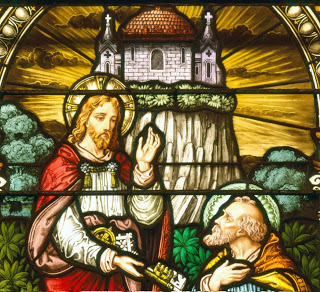

What a great way to bring the gospel alive, Father John! Also like the metaphor of offering up our own incense of sacrifice to the Lord … especially when the extraction of those things and the discomfort to self is as painstaking as the excavation of gold and the harvesting of myrrh and frankincense.